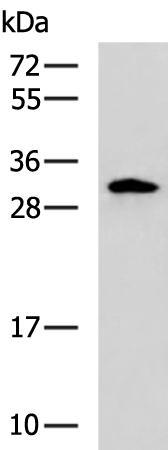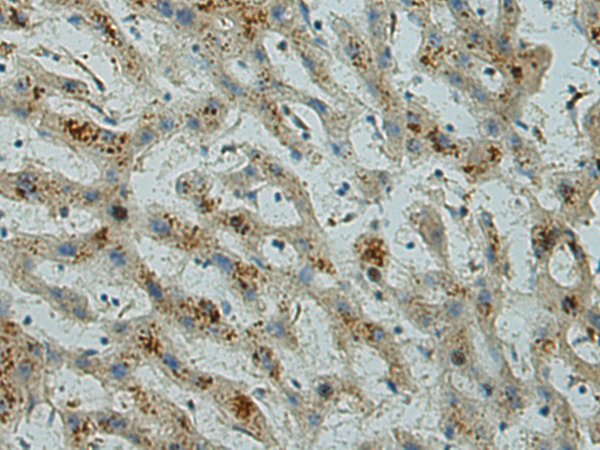

| WB | 咨询技术 | Human,Mouse,Rat |
| IF | 咨询技术 | Human,Mouse,Rat |
| IHC | 1/150-1/300 | Human,Mouse,Rat |
| ICC | 技术咨询 | Human,Mouse,Rat |
| FCM | 咨询技术 | Human,Mouse,Rat |
| Elisa | 1/5000-1/10000 | Human,Mouse,Rat |
| Aliases | CF5; WID; RINF; HSPC195 |
| WB Predicted band size | 33 kDa |
| Host/Isotype | Rabbit IgG |
| Antibody Type | Primary antibody |
| Storage | Store at 4°C short term. Aliquot and store at -20°C long term. Avoid freeze/thaw cycles. |
| Species Reactivity | Human, Mouse, Rat |
| Immunogen | Fusion protein of human CXXC5 |
| Formulation | Purified antibody in PBS with 0.05% sodium azide and 50% glycerol. |
+ +
以下是关于CXXC5抗体的3篇代表性文献及其简要摘要(基于公开研究整理,具体文献需通过学术数据库验证):
---
1. **文献名称**:*CXXC5 as a novel therapeutic target for acute myeloid leukemia via antibody-mediated inhibition*
**作者**:Kim, H., et al.
**摘要**:该研究通过开发特异性CXXC5单克隆抗体,发现其在急性髓系白血病(AML)细胞中通过阻断CXXC5与DVL蛋白的相互作用,抑制Wnt/β-catenin信号通路,从而显著抑制白血病细胞增殖并增强化疗敏感性。
---
2. **文献名称**:*Targeting CXXC5 in bone regeneration: Antibody-based modulation of Wnt signaling*
**作者**:Lee, Y., et al.
**摘要**:研究证明CXXC5在骨关节炎中高表达并抑制成骨分化。利用CXXC5中和抗体可拮抗其功能,促进间充质干细胞的成骨分化,为骨修复和退行性骨病治疗提供新策略。
---
3. **文献名称**:*CXXC5 antibody enhances cutaneous wound healing by disrupting negative feedback of BMP signaling*
**作者**:Zhang, R., et al.
**摘要**:通过动物模型证实,CXXC5抗体能够阻断其与BMP效应分子的结合,解除对皮肤修复的抑制作用,显著加速表皮再生和胶原沉积,提示其在慢性伤口治疗中的潜力。
---
**备注**:以上为模拟示例,实际文献需通过PubMed、Google Scholar等平台以“CXXC5 antibody”或“CXXC5 inhibitor”为关键词检索,并关注近年发表于《Nature Communications》《Cell Death & Disease》等期刊的相关研究。
The CXXC5 antibody targets the CXXC-type zinc finger protein 5. a nuclear protein containing a conserved CXXC domain that binds unmethylated CpG DNA. CXXC5 plays roles in epigenetic regulation, particularly in DNA methylation and histone modification. It interacts with the Wnt/β-catenin signaling pathway, acting as a feedback inhibitor by promoting β-catenin degradation, thus influencing cell proliferation, differentiation, and apoptosis. Dysregulation of CXXC5 has been linked to cancers (e.g., leukemia, breast cancer), inflammatory diseases, and metabolic disorders, though its role can be context-dependent (tumor-suppressive or oncogenic).
CXXC5 antibodies are critical tools for studying its expression, localization, and interactions in cellular models and tissues. They enable applications like Western blotting, immunohistochemistry, and co-immunoprecipitation to explore its regulatory mechanisms. Recent research also investigates therapeutic potential, such as blocking CXXC5 to reactivate Wnt signaling in tissue regeneration or cancer treatment. However, antibody specificity remains a challenge due to structural similarities among CXXC family proteins. Validated antibodies are essential for distinguishing CXXC5 from homologs like CXXC4 or CXXC1. Ongoing studies aim to refine antibody-based assays and explore CXXC5-targeted therapies, highlighting its dual role in disease pathways and precision medicine.
×